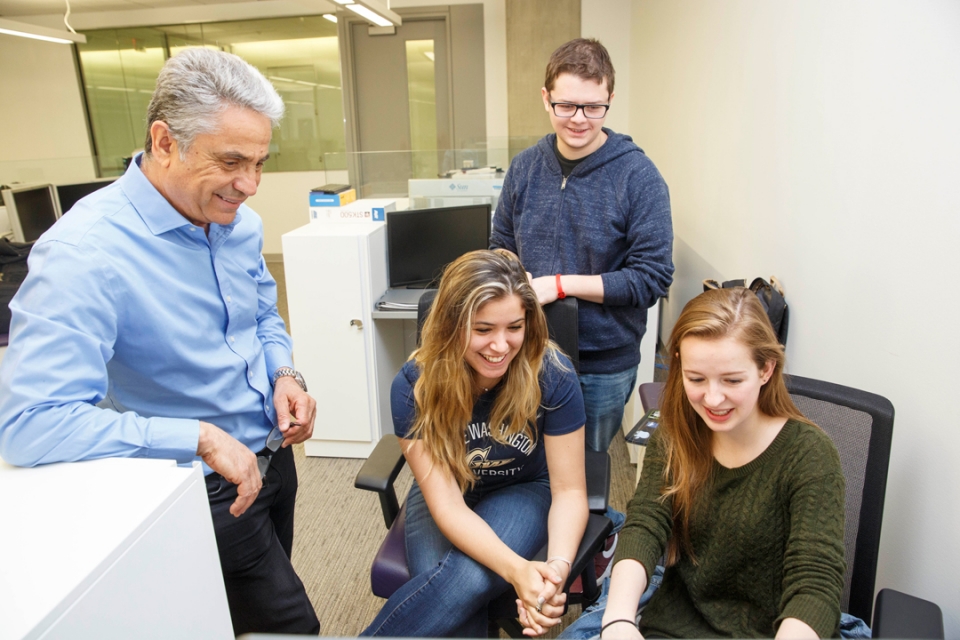Professor Ahmed Louri and his research team are working in the broad area of computer architecture, which is the field of research and study in computer engineering consisting of set of rules and design methods that describe the functionality, organization, and implementation of computer systems. It is the glue that connects all parts of a computing system together, including software, programming languages, execution models, and hardware. One can consider computer architecture to be the secret sauce that makes computers work the way they do.
Because societal innovations must run on computers with high performance, computing must, therefore, revolutionize computers so that they may continue to fuel scientific discoveries that will improve our fundamental understanding of the world and help develop solutions to major challenges facing our society. His research team designs high performance computers for the industries of energy, transportation, finance, and education.
Today, computing faces an inflection point that calls for dramatically new techniques and approaches. This inflection point is caused by several key challenges at the technological level, application level, and the computing goals and metrics levels, and Professor Louri’s team is conducting cutting-edge research to solve the above mentioned challenges and to invent novel parallel computer architectures and technologies which deliver high reliability, high performance, and energy-efficient solutions to important application domains and societal needs.
In the computer engineering realm, Moore’s Law is a popular phenomenon in which the number of transistors in a dense integrated circuit doubles approximately every two years. This trend, however, has slowed down and the reduction of cost per transistor is plateauing, which makes it increasingly difficult to extract more computer performance by employing more transistors on-chip. In addition, power limits within the Dennard Scaling theory and reduced semiconductor reliability will make device scaling more difficult in the future technological levels.
Simultaneously, at the application level, the computer engineering field is witnessing a new computing era calling for a migration from an algorithmic-based compute world to a learning-based, data-intensive, memory-centric computing paradigm in which human capabilities are scaled and magnified. Advances in many disciplines related to Artificial Intelligence, including machine learning, decision-making, inferencing, planning, robotics, and natural language processing are contributing to new products, services and experiences. This paradigm shift is driven by the abundance of data and the computing resources required to process it in application spaces spanning mobile/embedded computing, cloud/edge computing and the internet of things (IoT).
A final trend calling for attention is the metrics and goals by which computing is measured and evaluated. It is abundantly clear that performance-focused goals and other related metrics are no longer sufficient. In addition to delivering scaled performance, computing systems are expected to be energy-efficient, reliable, trustworthy, secure and be able to operate within manageable power budgets. While we are reaching the limits of Moore’s Law and Dennard Scaling, demands for performance in excess of 1 million trillion floating-point operations per second (1 exaflops) are arising from novel paradigms to address applications in big data, machine learning, and analytics from nearly countless resources.
Professor Louri’s research has far-reaching impacts on the computing industry and society at large. Current research topics include: (1) the use of machine learning techniques for designing energy-efficient, reliable multicore architectures, (2) scalable accelerator-rich reconfigurable heterogeneous architectures, (3) emerging interconnect technologies (silicon photonics, wireless, RF, hybrid) for network-on-chips (NoCs) & embedded systems, (4) exploring new Non-von Neumann computing models in order to design future computing systems that can process and continuously analyze large volumes of data while providing balanced energy-performance-reliability-security-functionality-cost trade-offs, (5) cloud and edge computing, (6) approximate computing and communications, (7) 3-D stacking and non-volatile random address memories.
Professor Louri currently has several federal research programs covering the above research topics. He is supporting 12 students and one post-doctoral researcher. He has published extensively in computing and the use of technology in leading journals in the IEEE Computer Society and other professional societies publication venues. These venues include IEEE Transactions on computers, IEEE transactions on Parallel and Distributed Systems, IEEE transactions on VLSI Systems, Journal of Parallel and Distributed Computing, ACM Journal of Emerging Technologies for Computing Systems, IEEE Transactions on Antennas and Propagation, among several others.
In addition, Professor Louri frequently delivers invited talks and presents his refereed work in leading conferences in the field including the IEEE International Symposium on High Performance Computer Architecture (HPCA), IEEE International Symposium on Computer Architecture (ISCA), IEEE International Parallel and Distributed Processing Symposium (IPDPS), IEEE/ACM International Symposium on Microarchitecture (MICRO), IEEE Design Automation Conference (DAC), and among several others.
For more information on Professor Louri’s research group, please visit the HPCAT website.


